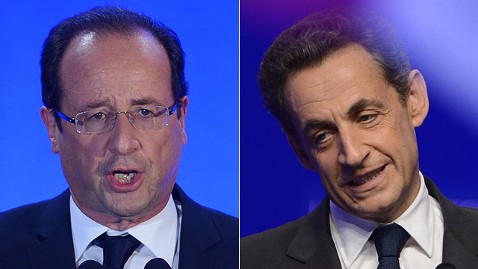Hollande Wins French Presidency, Promising 'New Hope for the World'

Credit: Philippe Desmazes and Eric Feferberg/AFP/Getty Images
French President Nicholas Sarkozy conceded defeat today in the presidential elections to Socialist candidate Francois Hollande, making him the first incumbent president to lose an election in France since 1981.
Hollande, who was leading 51.7 percent to 48.3 percent in the exit polls, will be France's first socialist president since Francois Mitterrand left office in 1995.
"I've tried to do my best to protect the French people from the unprecedented crisis that has shaken the world," said Sarkozy, whose defeat makes him the eighth leader of a Eurozone country to be replaced or swept from office in just over a year.
But Hollande's victory was a clear rejection of Sarkozy's attempts to get the debt crisis under control through an austerity program.
"Austerity can no longer be the only option for Europe," Hollande said today in his acceptance speech in reference to Sarkozy's policies to cut government spending.
Under Sarkozy, France's unemployment rate rose to 10 percent. Hollande wants to put France on a different economic track, promising to raise taxes on France's wealthiest and stimulate economic growth. During his campaign, Hollande promised to deliver more jobs for policemen and 60,000 jobs in the education sector without increasing France's total number of civil servants.
"May 6 gave us a new start for Europe, a new hope for the world," Hollande said today in his acceptance speech.
Hollande used one of President Obama's favorite campaign terms several times in his speech, noting that "change" is a "heavy mandate," but it is his "mission and duty."
But the potential for change under Hollande in the way Europe tackles its debt crisis, with more stimulus and less austerity, makes European and American markets nervous.
But experts say Hollande doesn't have a lot of room for maneuvering.
Nicole Bacharan, an expert on French-American relations at the Institute for Political Studies in Paris, said that it's unclear what impact Hollande's victory will have on European and American markets.
"Hollande wants to reopen negotiations on European monetary agreement," Bacharan said. "He thinks people are only focused on austerity and cutting spending and deficits. He wants to have something included about the necessity of economic growth, but he has been vague on how he will create that."
Today's parliamentary elections in Greece only added to the global economic uncertainty, as the potential Greek failure to secure bailout funds has far greater ramifications for the international markets than Hollande's French presidential victory.
After months of violent anti-austerity rioting, many Greek voters ditched the two parties that have led the country for decades, supporting austerity and securing European bailout funds.
According to the exit polls, the radical leftwing party Syriza has made strong gains and the far-right Golden Dawn party has won enough votes to enter parliament. This puts the Greek austerity plan in jeopardy, and, consequently, the Euro zone and global markets.